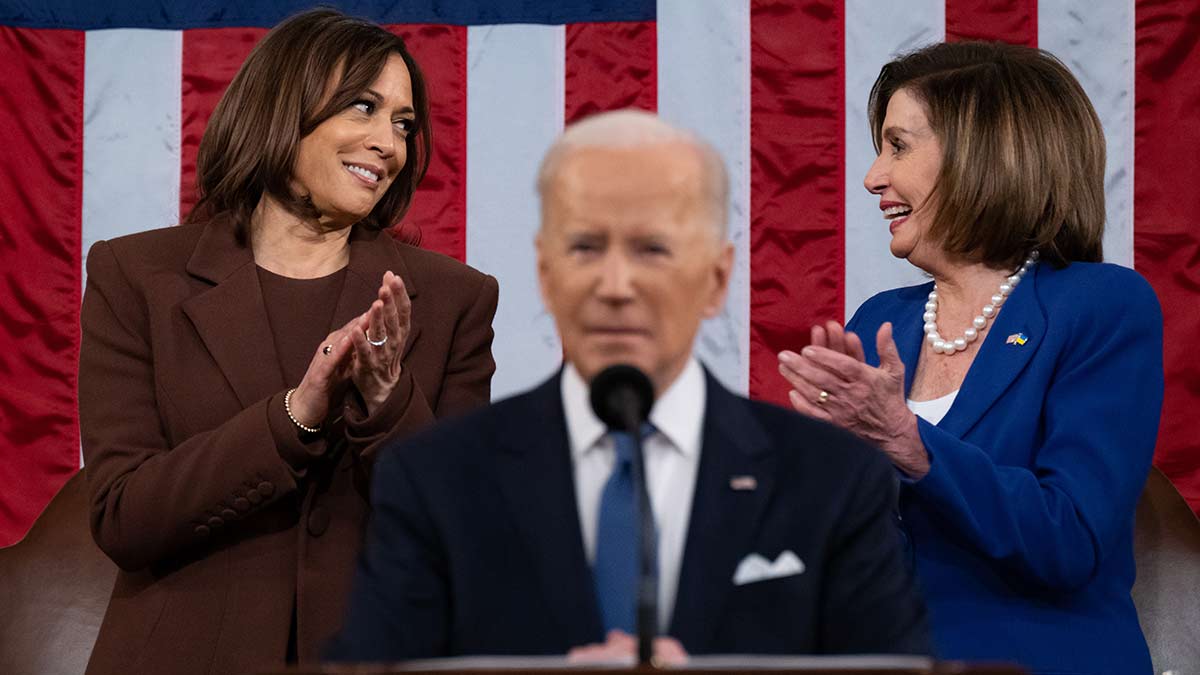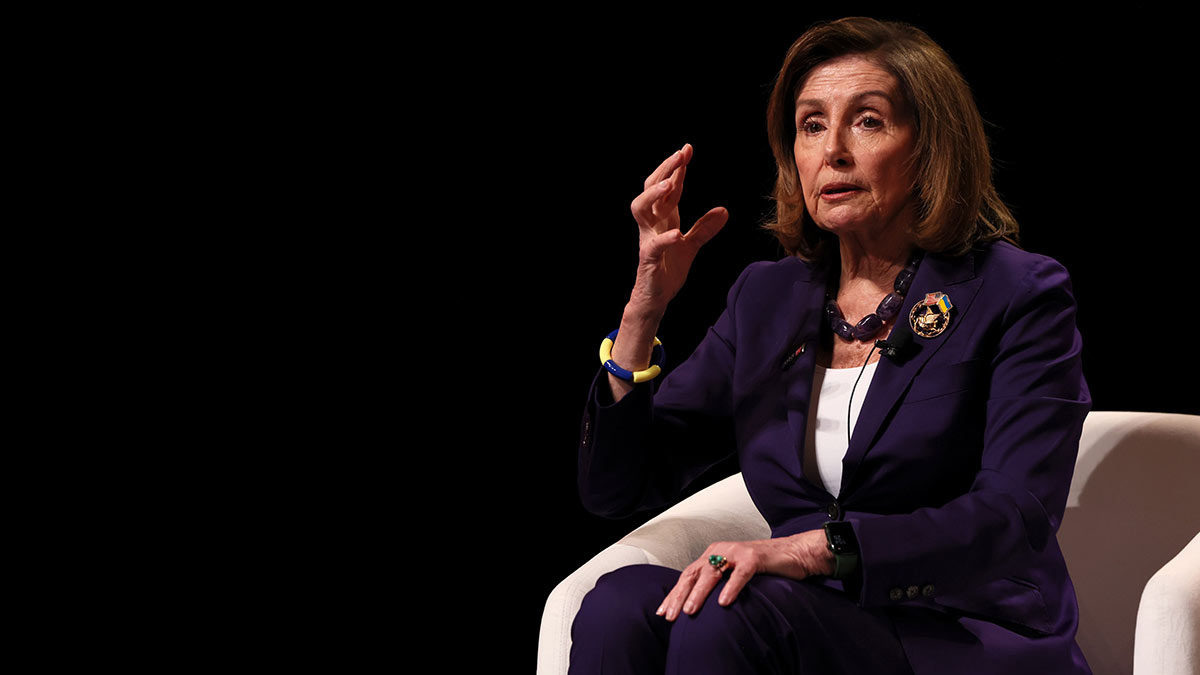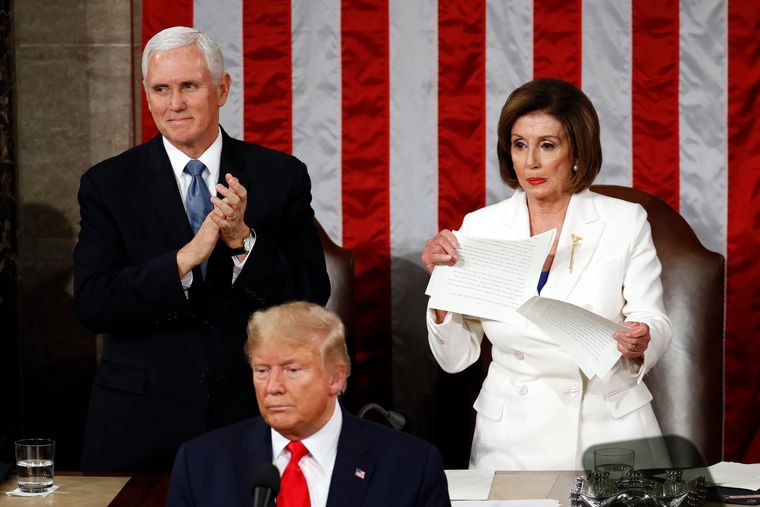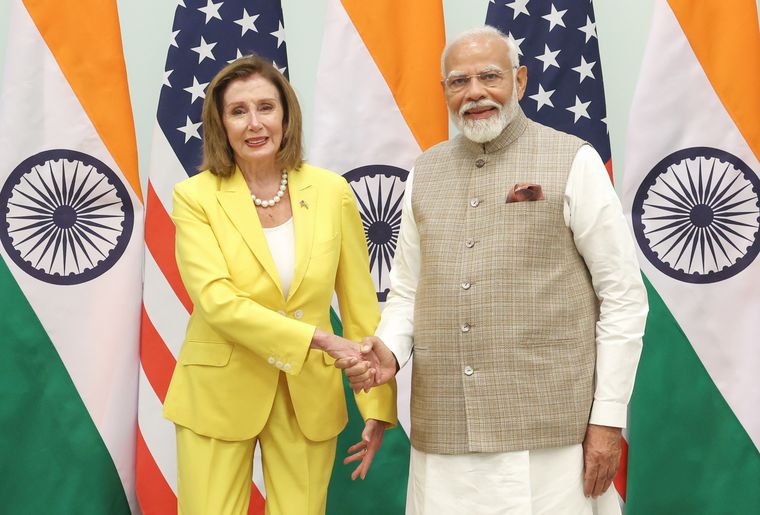Exclusive Interview/ Nancy Pelosi, Speaker Emerita, United States
Nancy Pelosi opens her latest book, The Art of Power, describing what was perhaps the most traumatic day of her life, personally. It was early in the morning on October 28, 2022, and she was in her apartment in Washington, DC. She was woken up by the Capitol Police and told that her husband, Paul, had been attacked at their home in San Francisco. The attacker had come for Pelosi, to punish her for being the “leader of the pack” against the former president Donald Trump. Paul suffered hammer blows to his head and doctors had to reshape his skull to save his life. Pelosi says she has been struggling with guilt ever since, but the attack seems to have strengthened the 84-year-old leader’s resolve to lead the fight against Trump.
Former speaker of the US House of Representatives, Pelosi, spoke with THE WEEK on August 12 about the Democratic Party’s campaign against Trump in the presidential elections. She sounded upbeat about the chances of Vice President Kamala Harris and said that she looked forward to not being the most powerful woman in American politics after Harris’s victory against Trump. About nudging President Joe Biden to quit the presidential race, she felt that the decision was about winnability. “You make every decision in favour of winning. And I wanted the decision to be as strong as possible,” she said. She also spoke about the legislative records of Biden and Barack Obama, the limits of bipartisanship and the potential of India-US relations. Edited excerpts from the exclusive interview:
Q/In your latest book, The Art of Power, you explain how you famously tangled with Donald Trump when he was president. You were a target, your home was a target, and your husband was attacked. The US is now in yet another election season. Do the scars still remain?
There are scars of trauma on our country when we have political violence. It must be stopped. There are paths that lead up to it that are self-evident, which must be stopped in terms of the politics of personal destruction and the rest, which the Republicans do all the time. Thank you for asking about my husband. He is improving and hopefully when it is two years, which will be at the end of October, we are hoping that he will have made even more progress with his therapy and the rest. But, for our children and our grandchildren, the trauma is not just that he was attacked, but that the Republican former president, his family and the Republican governors thought it was really funny. And that was really traumatising, too, for our family. But forget about them. They are who they are. We had thousands and thousands of messages of love and prayers and thoughtfulness from all over the world. I was at Normandy for the D-Day observance at the beginning of June, and every veteran―these are people in their late 90s or early 100s who had participated in the Normandy invasion to turn around World War II to the Allies’ advantage―asked how my husband was. It was so moving and meant so much to him.
Q/ The Art of Power speaks about your transformation from being a housewife and how you really took up cudgels for women and became the most powerful woman politician in America.
I keep saying to anyone who wants to run for public office, ‘Know your why’. My ‘why’ was that one in five children in America lived in poverty, went to sleep hungry at night. As a mother of five, I found that totally unacceptable. So my volunteerism in the Democratic Party before I even ran for office was motivated by that ‘why’. And I say that to people because this is not for the faint of heart. It is rough out there. And if you don’t know your ‘why’, it is hard to take it. But if you know your ‘why’, you know it’s worth it.
 Plan of action: Vice President Kamala Harris and Nancy Pelosi applaud as President Joe Biden delivers his first State of the Union address on March 1, 2022 | Getty Images
Plan of action: Vice President Kamala Harris and Nancy Pelosi applaud as President Joe Biden delivers his first State of the Union address on March 1, 2022 | Getty Images
I am not saying that getting your husband hit over the head is worth it, but the slings and arrows that you will receive, politically speaking, make it worth it. The children make it worth it. I never intended to run for office. I was asked to run. I didn’t have any ambition to. People encouraged me to do that. It was a tough campaign, but I won. It was the same running for leadership. I never thought about running, but people encouraged me to do so. And I got tired of losing elections. The Democrats in Congress would lose [the elections in] 1994, 96, 98 and 2000. So I said, ‘Ok, I know how to win elections’. We won. And winning was a very persuasive motivation for me to become speaker of the house.
Q/Yesterday (August 11) you welcomed Vice President Kamala Harris back to California at a fundraiser. You said she brought so much joy and hope. You were the first woman speaker of the US. And now Harris could be the first woman president, the first black woman president and the first Indian American president.
I think the United States is ready to elect Kamala Harris because she is the best. I am very thrilled and I look forward to not being the most powerful woman in politics in America when she will become president of the United States. Now, Kamala happens to be a woman. She happens to be black. She happens to be an Indian American. But she is the best. And that’s why people should be voting for her. That’s why I think she will win. I think that whatever questions people might have about a woman… are completely offset by her excellence.
I know her very well for a long time. She is a person of deep faith, which motivates her public service to care for other people and to do so, again, with liberty and justice for all. She is a person of great strength. She knows her policy. She knows the strategy about it. And she is a fighter for the people.... It has been her motivation always, as district attorney and as attorney general. She is politically very astute. It was hard for her to win the district attorney race, even harder to become attorney general. But she managed that. It got easier to become a senator and the vice president. So she knows why she’s in this. She has served with Joe Biden and produced great change for our country.
Kamala takes great pride in her heritage, her mother being born in India, raised her and gave her great guidance and her African-American background as well. She went to Howard University, which is a historically black university in our country. So she’s always taken pride. And I do believe she will win. We made a decision that we would not elect that other guy to the White House. And President Biden made a decision in favour of Kamala Harris.
Q/You played a key role in persuading President Biden to quit the race. How did you and the Democratic Party manage to convince the president? And has it affected your relationship with him?
I really have avoided answering the question about any conversations I have with the president, and I hope it has not had an effect on our relationship. I have admired him for over 40 years. I wasn’t even in Congress yet when I saw him in action as a senator. So I love him very much. I pray over our decisions that we have to make. I’m sad about some of it, but winning an election is a decision. You make a decision to win and you make every decision in favour of winning. And I wanted the decision to be as strong as possible. He could have decided that he would be the candidate and his campaign would become stronger. He made a different decision. I respect him for that. And then he immediately endorsed Kamala. We had thought that there would be perhaps an open process [to select the new candidate] so that people could see the significant talent that we have. As soon as the president endorsed her, it was an open process. But she won. Kamala is very politically astute. So we are excited about her candidacy.
Q/Your book explains how closely you worked with President Biden. How do you look at his record? Will it help Harris?
We are grateful to the president for being one of the most consequential presidents our country has seen in modern times. He and Kamala together did great things, including creating 15 million jobs. The other guy [Trump] has the worst job creation record since Herbert Hoover, who was president during the Great Depression, whose policies caused the Great Depression. President Biden and Kamala did great things, like the American Rescue Package to save us from Covid. The previous president was in denial and many people died. Joe Biden came in [with] Kamala Harris, shots in the arms, money in the pockets, children safely in school, workers safely back to work. A child tax credit taking over 50 per cent of the children out of poverty. A bipartisan infrastructure bill to create jobs, also having a piece of it to protect our environment from the climate crisis. The CHIPS (Creating Helpful Incentives to Produce Semiconductors) Act and the PACT (Promise to Address Comprehensive Toxics) Act, which addressed the concerns of our veterans who had been exposed to burn pits―a million of them already have had benefits from it. And then the IRA (Inflation Reduction Act) to save our planet, $370 billion allocated in public, private and non-profit partnerships to stop the assault on our environment. That bill also reduced the cost of prescription drugs, something we have been trying to do for a long time, but were not able to do because of the power of the industry. But we were able to do it under Joe Biden and Kamala Harris.
People don’t elect you for what you have done. They elect you for what they hope you will do. So we have some unfinished business about housing, about child care, about family and medical leave. And Kamala puts it forth with great clarity, with great determination, removes all doubt that kitchen table issues of America’s working families will be addressed under her leadership when she becomes the next president of the United States.
Q/The two issues that dominate the elections are abortion rights and immigration. While Harris is strong on reproductive rights, the Republicans have an advantage on border security.
A woman’s right to choose is a personal freedom issue. It is also an economic issue for families―the size, the timing, and if they’re going to have a family or increase the size of their family. So this is something that women and families across America feel very concerned about. When I visited India many years ago, women would say, ‘Please make sure that we have access to family planning’. Of course, India has had a prime minister, Indira Gandhi, so you have led the way in that regard. But I am talking about poor women in the community. In the Congress, we had a bill on the floor that said women had a right to contraception. How many Republicans do you think voted for that? None of them voted for women having the right to choose, but you expect that. That’s what they believe.... Women see who is there in their interest.
Q/What about immigration and the border?
The Republicans made a big mistake when they refused to pass the bipartisan bill [on border security] in the house. It passed in the senate in a bipartisan way. And the senate is hard because you need 60 votes. But they got that. It wasn’t a bill I would have written, but it was a bill that I would accept because it helped solve the problem. And it would be signed by the president of the United States, Joe Biden. The Republicans in the house refused to bring it up. People admit now that that was a big mistake. We know there is a path for us to get to having better policy, that everything with our immigration system is not working the way it should. And Kamala Harris understands that. But she also has been really a leader [who was asked] what are the causes of this migration to the United States? What are the causes in Latin America, for example? She has visited there. It’s about the economy there. It’s about violence there. It’s about the climate crisis. Farmers are not able to farm because of droughts. So they don’t have a job and they don’t have food. So they migrate to the United States. You’d be surprised how many people here are Dreamers―those who came with their families when they were children. We want to be able to say these people are a blessing to us. Immigration is what has made America great. The best speech ever about it was by Ronald Reagan. He talked about America being preeminent in the world because we have newcomers who bring their hope, optimism, courage and determination to make the future better for their families. He said when the door was open, we would remain preeminent. When we close that door, we will not be preeminent in the world.
So we recognise that we are a nation of immigrants. We do have to fix the system so that we have a proper process to accommodate people coming here or just tell them not to come if they don’t meet the standard of coming into our country. But it is a challenge because the Republicans go around saying all these people are crooks and thieves and dangerous. And that’s not what this is about. There have been solutions that the Republicans have rejected. Now what we have to do is win the house so that when we get a bill in the senate, we can pass it in the house of representatives as well. One of the reasons the [Republican-led] house didn’t do it, though, is they didn’t want Biden to have this victory.
Q/In your book, you describe that as speaker of the house, you tried to find common ground with all the presidents you worked with. There were also times when you stood your ground.
My flagship issue, of course, was the Affordable Care Act (the health care reform under president Obama), and that was a challenge because we have regional differences in our country. We’re very diverse. We take pride in that. And we came together in unity to pass this bill.
I mentioned bills with President Biden which were largely passed with Democratic votes. We had 13 [Republican votes] for the infrastructure bill. We had 24 for the CHIPS Act. We had zero for the American Rescue Plan to take us out of the depths of Covid. We had zero Republican votes for the climate and reducing the cost of prescription drugs. So we’ve striven for some bipartisanship, but not always achieving it. But it did not mean that the Republicans don’t benefit from these bills and have not showed up at ribbon cuttings and groundbreakings and celebrations for all these things, even though they voted against it because they didn’t want Biden to have any victories. And same thing with Obama. They are anti-science, they are anti-governance. And that’s a sad testimony, but that’s who they are. And then they are against whoever the Democratic president is. Trump really did not have an agenda because he didn’t believe in science or governance. But we did have to keep the government open. And that meant we had to pass the budget bills. So we had to use our leverage. He said he would take pride in shutting down the government. That was beyond silly. That was dangerous. Nonetheless, that’s what he said. So we had to negotiate to keep the government open. The biggest element in that, though, is the public sentiment. President Lincoln said public sentiment was everything. If you are with it, you can do almost anything, and without it, practically nothing. That is very much a part of how we were able to pass our bills and negotiate with Trump when he was president. There are small examples of how, for example, when he did the Abraham Accords, we were all supportive of that. But he said we couldn’t have anything in the bill that helped anybody globally. And then he came to me and said, ‘We need $700 million for Sudan’. I said, ‘If you want $700 million for Sudan, I need $4 billion for vaccines globally’, mostly for children. So there was a negotiation. I got the $4 billion.
They also wanted money to compensate for what we were losing in their trade agreement charges against China. And they said that we cannot have any money for school lunch programmes. So when we gave them the money to correct what they did with China, I got $8 billion for the children. So, again, you cannot negotiate unless they want something. The one thing they did when they [had the presidency and the Congress] was to pass a bill, a tax cut to get 83 per cent of the benefits to the top 1 per cent, adding two trillion dollars to the national debt. And when we wanted to feed the children, they would say it was going to add to the national debt. Anyway, there’s some of the dynamics of where we could come together, and where we could not.
Q/On India-US ties, despite several areas of convergence, the relationship has not always been very smooth. Can Kamala Harris take care of these challenges?
I certainly hope so. I have always been an admirer of India since I was a little girl and learned about Mahatma Gandhi in the 1950s. America learned a great deal from India on non-violence and from Gandhi’s philosophy. Martin Luther King and his wife, Coretta Scott King, went to India and learned more about that. So we feel that connection to India with great respect for India.
The issues between countries have to be dealt with with respect, not with condescension. When John F. Kennedy became president, I was a student, and I went to his inauguration. He said to the people of America, ‘It’s not what our country can do for you, but what you can do for your country’. The next sentence was that the citizens of the world should not ask what America could do for them, but what [could be done] working together for the freedom of mankind. And that’s what Joe Biden and Kamala Harris have been about―respect, not condescension, but cooperation and collaboration. So we learn from each other.
We were just there in India. We visited Prime Minister Modi. It was a very positive visit. We met the Dalai Lama. We thank India for your hospitality to the Tibetans and the Dalai Lama. So we have shared values. But countries act in their interest. From a security standpoint, we have a great deal in common. We just have to have clarity in terms of what the priorities are. Kamala, so proud of her heritage, appreciates the relationship between our two countries. You just have to hear from her because it’s her presidency and her heritage.
We certainly have common ground in many areas and we want to be respectful on how we prioritise the resolution of any differences we may have. We are very blessed with many people from India who are part of the economic success and the values of our country. There are a growing number of people from India in America who have started many successful businesses. So we have a lot to draw upon in terms of that friendship.
―with Ajish P. Joy




